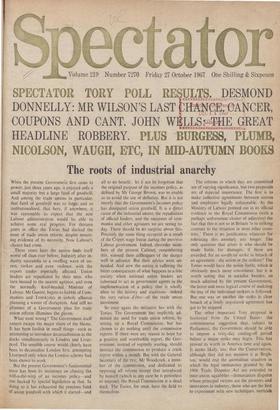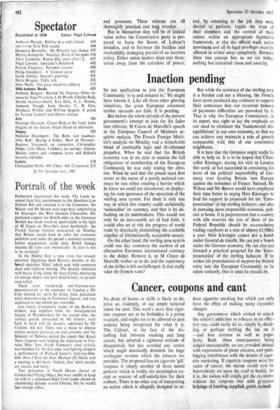The roots of industrial anarchy
When the present Government first came to power, just three years ago, it enjoyed only a small majority but a large fund of goodwill.
And among the trade unions in particular, that fund of goodwill was so large, and so institutionalised, that here, if anywhere. it was reasonable to expect that the new Labour administration would be able to achieve some real progress. For thirteen years in office the Tories had ducked the issue of trade union reform, despite mount- ing evidence of its necessity. Now Labour's chance had come.
Three years later the nation finds itself worse off than ever before. Industry after in- dustry succumbs to a swelling wave of un- rest, strikes and even violence, • with the export trades especially affected. Union leaders are repudiated by their men, Who turn instead to the nearest agitator, and even the normally level-headed Minister of Labour, Mr Gunter, begins to babble of Com- munists and Trotskyites in unholy alliance planning a winter of disruption. And still no glimmer of a Government plan for trade union reform illumines the gloom.
What went wrong? The Government itself ,cannot escape the major share of the blame. It has been foolish in small things—such as attempting to introduce decasualisation in the docks simultaneously in London and Liver- pool. The sensible course would clearly have been to decasualise London first, attempting Liverpool only when the London scheme had been shown to work.
But the present Government's fundamental error has been its insistence on chasing the will-o-the-wisp of an incomes policy—and one backed by special legislation at that. In doing so it has exhausted the precious fund of union goodwill with which it started—and all to no benefit : let it not be. forgotten that the original purpose of the incomes policy, as
defined by Mr George Brown, was to enable us to avoid the use of deflation. But it is not merely that the Government's incomes policy has dissipated union goodwill. It is a direct cause of the industrial unrest, the repudiation of official leaders, and the successes of com- munist and other agitators we are seeing to- day. There should be no surprise about this. Precisely the same thing occurred as a result of the Cripps wage freeze during the previous Labour government. Indeed, shrewder mem- bers of the present Cabinet, remembering this, warned their c011eagues of the danger well in advance. But their advice went un- heeded. And now the nation is suffering the bitter consequences of what happens in a free society when national union leaders are suborned to act as government agents in the implementation of a policy that is wholly alien to the history and traditions--indeed the very raison d'être—of the trade union movement.
So once again the initiative lies with the Tories, The Government has implicitly ad- mitted the need for trade union reform, by setting up a Royal Commission, but has chosen to do nothing until the commission reports. If there were any reason to hope for a positive and worthwhile report, the Gov- ernment, instead of supinely waiting, should instruct the commission to produce a crash report within a month. But with the General Secretary of the TUC, Mr Woodcock, a mem- ber of the commission, and dedicated to opposing all reform except that introduced by himself (which in any case he is powerless to impose), thesRoyal Commission is a dead duck. The Tories, for once, have the field to r themselves.
The reforms to which they are committed are of varying significance, but two proposals
are of especial .importance. The first is to make collective agreements between unions and employers legally enforceable. As the Ministry of Labour pointed out in its official evidence to the Royal Commission (with a perhaps unfortunate choice of adjective) the fact that this is not so in Britain 'is in striking contrast to the situation in most other coun- tries." There is no justification whatever for tolerating this anomaly any longer. The only question that arises is who should be made liable for damages, if these are awarded, for an unofficial strike in breach Of an agreement—the union or the strikers? The Tories would have the union liable, which is obviously much more convenient: but it is worth noting that in socialist Sweden, so much admired by the present Government, the fairer and more logical course of mulcting the pay of the individual strikers is followed. But one way or another the strike in clear breach of a freely negotiated agreement has got to be stopped.
The other important Tory proposal is borrowed from the United States : the commonsense suggestion that, subject to Parliament, the Government should be able to impose a sixty-day cooling-oft period before a major strike may begin. This has proved its worth in America time and again. It seems likely, too, that the .conservatives. although they did not mention it at Brigh- ton, would end the anomalous situation in which the legal immunities granted by the 1906 Trade Disputes Act are extended to inter-union squabbles—demarcation disputes whose principal victims are the pioneers and innovators in industry, those who are the first to experiment with new techniques. methods
and processes. These reforms are all thoroughly practical and long overdue. But in themselves they will be of limited value unless the Conservative party is pre- pared to learn the lesson , of Labour's mistakes, and to forswear the fruitless and incalcplatily, damaging pursuiti of an incemes policy. Either union leaders Must tear them- selves away from the corridors of Power, and, by returning to the job they were elected to perform, regain the trust of their members and the control of their unions within an appropriate legislative framework; or else the official trade union movement and all its legal privileges must be allowed to wither' away cOmpletely. Between these two courses lies, as we . see today, nothing but industrial chaos and anarchy.











































 Previous page
Previous page